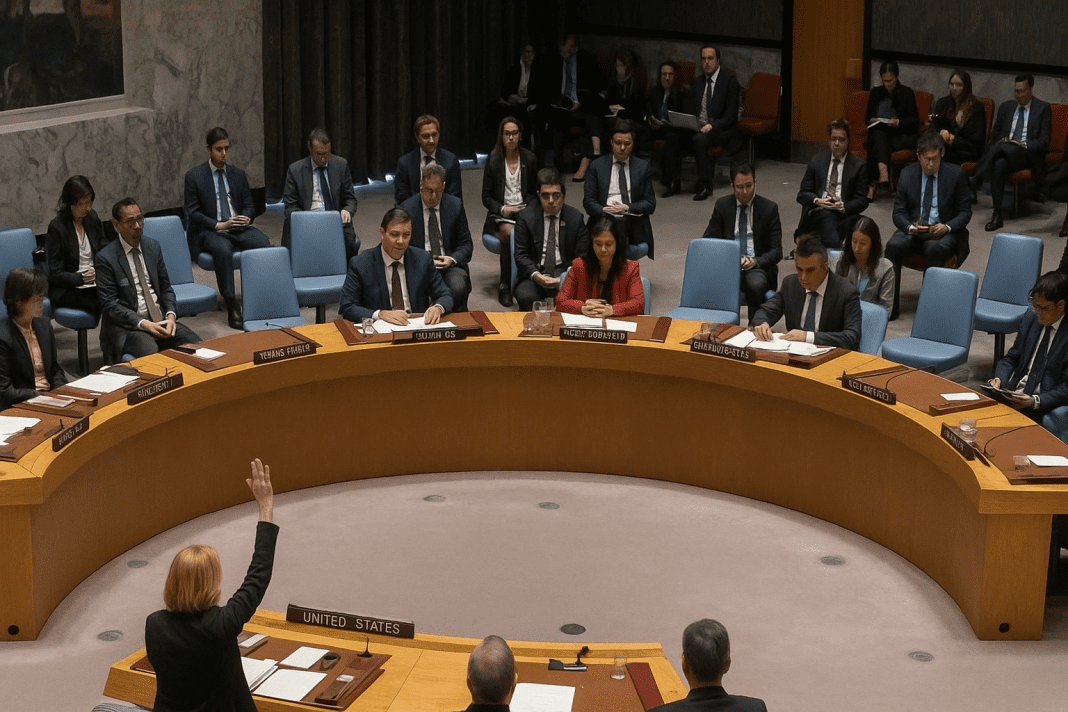The United States vetoed a United Nations Security Council resolution that demanded an immediate and permanent ceasefire in Gaza along with the release of hostages. Fourteen other members of the council supported the resolution, but the U.S. rejection prevented it from being adopted.
UN Security Council Vote on Gaza Ceasefire
The resolution described the humanitarian situation in Gaza as catastrophic. It called for Israel to lift restrictions on aid deliveries to the 2.1 million people living in the territory. It also tied a ceasefire directly to the release of all hostages held by militant groups.
The U.S. opposed the resolution because it did not specifically condemn Hamas or recognize Israel’s right to defend itself. Officials said the wording legitimized false narratives and ignored American warnings about unacceptable language. The veto highlighted the isolation of the U.S. and Israel on the global stage regarding the war, which has been ongoing for nearly two years.
Trump and Netanyahu Discuss Gaza Ceasefire, Iran, and Regional Stability
The vote took place just days before the annual United Nations General Assembly gathering, where Gaza and the issue of a ceasefire are expected to be central topics. Many U.S. allies are preparing to recognize an independent Palestinian state, a move opposed by both Israel and the U.S.
Humanitarian Crisis and Global Push for Ceasefire
The resolution was drafted by ten elected members of the Security Council who serve two-year terms. It went further than earlier proposals by emphasizing the deepening suffering of Palestinian civilians. The text expressed alarm over reports from international food crisis authorities warning of famine spreading across Gaza without an immediate ceasefire and unrestricted aid access.
Despite failing to pass, several member states voiced strong disappointment. They described the situation as a dark moment and expressed regret to the Palestinian people. Fourteen countries had voted in favor, underscoring broad international support for urgent ceasefire action.
US Pressure Backfires: Qatar and Egypt Fail in Gaza Ceasefire Push
Some nations stressed that the Security Council had a responsibility to act in the face of severe humanitarian conditions. Others said the veto represented performative action that blocked a collective ceasefire response. Algeria, which played a key role in drafting the resolution, expressed dismay and apologized for not being able to secure protection for civilians.
Israeli Offensive and Other UN Actions
Meanwhile, Israeli forces launched a new ground offensive in Gaza City. The military said its goal was to destroy Hamas’ military infrastructure. No timeline was given for the campaign, though indications suggested it could last for months. The escalation further complicates any prospects of reaching a ceasefire in the near term.
The United Nations Human Rights Council also released a report through independent experts. The report concluded that Israel is committing genocide in Gaza and called on the international community to take steps against those responsible.
In addition, the U.N. General Assembly voted overwhelmingly to reaffirm support for a two-state solution. It urged Israel to accept the establishment of a Palestinian state, a move backed by the majority of countries worldwide.
Gaza Ceasefire and Regional Stability Amid Rising Tensions
Within the United States, public opinion is showing shifts. Surveys reveal that about half of Americans now believe Israel’s military response in Gaza has gone too far, compared to 40% in late 2023. However, fewer Americans view ceasefire negotiations as a top priority for their government compared to earlier months when talks with Hamas were ongoing.
The Security Council session where the vote was held marked its 10,000th meeting, adding historical weight to the event. While the resolution did not pass, the overwhelming support from other members highlighted the growing divide between the U.S. stance and that of much of the international community, especially on the ceasefire issue.

